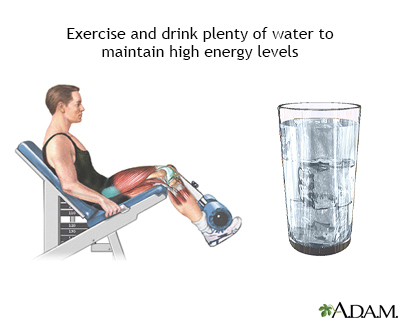How to avoid overheating during exercise
Heat exhaustion; Heat cramps; Heatstroke
Images

I Would Like to Learn About:
Description
Whether you are exercising in warm weather or in a steamy gym, you are more at risk for overheating. Learn how heat affects your body, and get tips for staying cool when it is warm out. Being prepared can help you safely work out in most conditions.
How Heat Affects Your Body
Your body has a natural cooling system. It is always working to maintain a safe body temperature. Sweating helps your body cool down.
When you exercise in the heat, your cooling system has to work harder. Your body sends more blood to your skin and away from your muscles. This increases your heart rate. You sweat a lot, losing fluids in your body. If it is humid, sweat stays on your skin, which makes it hard for your body to cool itself.
Warm-weather exercise puts you at risk for heat emergencies, such as:
- Heat cramps. Muscle cramps, usually in the legs or stomach (caused by loss of salt from sweating). This may be the first sign of overheating.
- Heat exhaustion. Heavy sweating, cold and clammy skin, nausea and vomiting.
- Heatstroke. When the body temperature rises above 104°F (40°C). Heatstroke is a life-threatening condition.
Children, older adults, and obese people have a higher risk for these illnesses. People taking certain medicines and people with heart disease also have a higher risk. However, even a top athlete in superb condition can get heat illness.
Stay Cool During Exercise
Try these tips to help prevent heat-related illness:
- Drink plenty of fluids. Drink before, during, and after your workout. Drink even if you do not feel thirsty. You can tell you are getting enough if your urine is light or very pale yellow.
- Do not drink alcohol, caffeine, or drinks with a lot of sugar, such as soda. They can cause you to lose fluids.
- Water is your best choice for less-intense workouts. If you will be exercising for a couple of hours, you may want to choose a sports drink. These replace salts and minerals as well as fluids. Choose lower-calorie options. They have less sugar.
- Make sure the water or sports drinks are cool, but not too cold. Very cold drinks may cause stomach cramps.
- Limit your training on very hot days. Try training in the early morning or later at night.
- Choose the right clothing for your activity. Lighter colors and wicking fabrics are good choices.
- Protect yourself from direct sun with sunglasses and a hat. Do not forget sunscreen (SPF 30 or higher).
- Rest often in shady areas or try to stay on the shady side of a walking or hiking trail.
- Do not take salt tablets. They can increase your risk for dehydration.
Signs of Heat Illness
Know the early warning signs of heat exhaustion:
- Heavy sweating
- Tiredness
- Thirsty
- Muscle cramps
Later signs may include:
- Weakness
- Dizziness
- Headache
- Nausea or vomiting
- Cool, moist skin
- Dark urine
Signs of heatstroke may include:
- Fever (over 104°F [40°C])
- Red, hot, dry skin
- Rapid, shallow breathing
- Rapid, weak pulse
- Irrational behavior
- Extreme confusion
- Seizure
- Loss of consciousness
As soon as you notice early signs of a heat illness, get out of the heat or sun right away. Remove extra layers of clothing. Drink water or a sports drink.
When to Call the Doctor
Contact your health care provider if you have signs of heat exhaustion and do not feel better 1 hour after getting away from heat and drinking fluids.
Call 911 or your local emergency number for signs of heatstroke.
References
Buschmann JL, Buell J. Sports nutrition. In: Miller MD, Thompson SR, eds. DeLee, Drez, & Miller's Orthopaedic Sports Medicine. 5th ed. Philadelphia, PA: Elsevier; 2020:chap 25.
Centers for Disease Control and Prevention website. Heat and athletes. www.cdc.gov/disasters/extremeheat/athletes.html. Updated June 19, 2019. Accessed November 24, 2022.
Centers for Disease Control and Prevention website. Warning signs and symptoms of heat-related illness. www.cdc.gov/disasters/extremeheat/warning.html. Updated September 1, 2017. Accessed November 24, 2022.
BACK TO TOPReview Date: 8/11/2022
Reviewed By: Linda J. Vorvick, MD, Clinical Professor, Department of Family Medicine, UW Medicine, School of Medicine, University of Washington, Seattle, WA. Also reviewed by David C. Dugdale, MD, Medical Director, Brenda Conaway, Editorial Director, and the A.D.A.M. Editorial team.

Health Content Provider
06/01/2025
|
A.D.A.M., Inc. is accredited by URAC, for Health Content Provider (www.urac.org). URAC's accreditation program is an independent audit to verify that A.D.A.M. follows rigorous standards of quality and accountability. A.D.A.M. is among the first to achieve this important distinction for online health information and services. Learn more about A.D.A.M.'s editorial policy, editorial process and privacy policy. A.D.A.M. is also a founding member of Hi-Ethics. This site complied with the HONcode standard for trustworthy health information from 1995 to 2022, after which HON (Health On the Net, a not-for-profit organization that promoted transparent and reliable health information online) was discontinued. |
The information provided herein should not be used during any medical emergency or for the diagnosis or treatment of any medical condition. A licensed medical professional should be consulted for diagnosis and treatment of any and all medical conditions. Links to other sites are provided for information only -- they do not constitute endorsements of those other sites. © 1997- 2024 A.D.A.M., a business unit of Ebix, Inc. Any duplication or distribution of the information contained herein is strictly prohibited.
